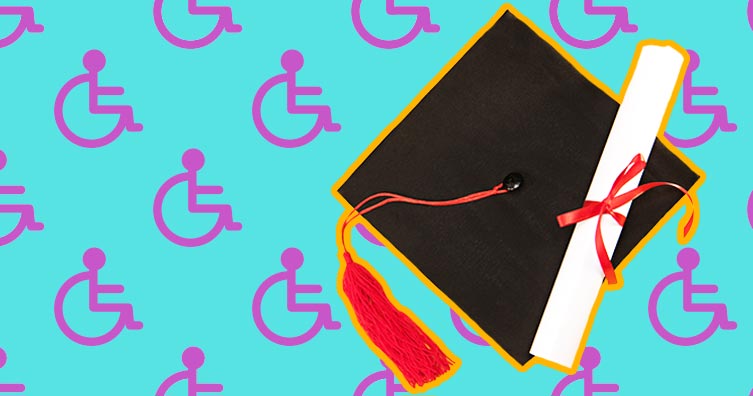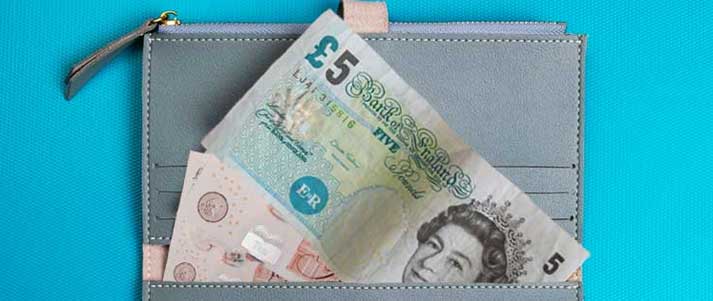Disabled Students’ Allowances (DSA) guide 2024
After the joys of applying for Student Finance, the thought of filling out yet another form is hardly ideal. But, with this guide, the whole process of applying for DSA will seem like a breeze.

Credit: LightField Studios, Ilya Sergeevych – Shutterstock
If your ability to study is affected by a disability, learning difficulty or health problem (physical or mental), you could be entitled to extra support and funding on top of your Student Finance.
When applying for Disabled Students' Allowances (DSA), it can feel like there are too many things to think about and hurdles to get through to receive the funding you deserve. But in reality, the process is actually pretty straightforward – when you know what to expect.
We're here with all the info you need, to make the whole thing feel much less daunting. Whether you're yet to start uni or you're a current student looking to apply for DSA, this guide will help.
What's in this guide?
What are Disabled Students' Allowances (DSA)?
With DSA, you can get extra funding of potentially £10,000s each year, on top of your Student Finance, to cover the costs of any equipment and services you need as a student with disabilities.
You don't have to pay back DSA unless you're overpaid or you leave your course early, in which case you may have to pay some back. It's best to check with your Student Finance provider if you'd like more info about this.
And, unlike Maintenance Loans, your household income doesn't affect how much DSA you receive.
The overall amount is based on how much you'll need for specialist equipment, non-medical help and additional costs related to your disability and is in no way contingent on how much money your parents make.
As DSA is tailored to your needs, it can make day-to-day student life a lot easier, particularly in terms of attending class, notetaking, revision and travelling for placements and study abroad trips.
However, DSA only covers costs that are directly linked to aspects of your disability that affect your ability to study.
For example, as the majority of students are faced with the cost of a laptop, you may be asked to contribute money towards one. The government says that students who receive DSA need to pay the first £200 when buying a computer – but please note, this is referring to DSA funding from SFE for students from England.
This means that, if you're receiving funding from SFE and you require a specialist computer that suits your needs, you may then be able to receive DSA funding, minus that first £200, to cover the costs. However, check with your uni to see if they have a scheme to help students with the £200 contribution.
Who is eligible for DSA?

Credit: Watchara Ritjan – Shutterstock
As a guideline, you will need to meet these criteria to be eligible for DSA:
- You're a UK resident
- You're an undergraduate or postgraduate student on a course that lasts at least a year (including part-time, Open University and distance learning courses)
- You qualify for Student Finance
- You have a physical disability, long-term health condition, sensory disability, mental health condition or specific learning difficulty that affects your ability to study.
You're unfortunately not likely to be eligible for DSA if:
- You're only eligible for tuition fee support
- You're doing a higher or degree apprenticeship
- You're getting equivalent support from another source, such as your uni or a social work bursary (including the NHS Disabled Students' Allowances).
Note: This is a guideline on the general criteria for DSA applications in the UK. To see the specific eligibility criteria for your part of the UK, visit your Student Finance body's website.
How to apply for Disabled Students' Allowances (DSA)
Applying for DSA is pretty straightforward, starting with a form to fill out.
You'll find the relevant form on the Student Finance website for your part of the country (listed below).
You will either need to complete the DSA application form online or on paper, depending on which Student Finance body you're applying through and your student status (i.e. if you're a full-time, part-time or postgraduate student).
When should you apply for DSA?
You can actually apply for DSA before your place at university is confirmed.
The length of time that the application process takes can vary across the UK. It could take up to 14 weeks for your DSA support to be put in place, so it's best to start your application as soon as possible.
There's so much to think about when starting uni, from making friends to deciding where to live. Having your DSA sorted ahead of your first day of freshers' week will make a massive difference.
Which organisations can you apply for DSA through?
Here's where to apply for DSA, based on whereabouts in the UK you're from:
- England – Student Finance England (SFE)
- Scotland – Student Awards Agency Scotland (SAAS)
- Wales – Student Finance Wales
- Northern Ireland – Student Finance NI.
Application process for DSA

Credit: astarot – Shutterstock
These are the steps you can expect to take when applying for the Disabled Students' Allowances (DSA):
- Fill in your DSA application
- Provide evidence of your disability
- Book and attend a study needs assessment (only after being asked to do so by the Student Finance organisation)
- Wait to hear if your application's been approved
- Once funding has been approved, order your equipment and arrange non-medical help, etc.
- Your DSA will be paid as agreed (i.e. to you as reimbursement or directly to the supplier).
Proof of eligibility
When you apply for DSA, you'll need certain types of documentation to show that you're eligible. This is the documentation you can expect to provide:
| Condition | Proof of eligibility |
|---|---|
| Physical or sensory disabilities, long-term health conditions and mental-health conditions | A disability evidence form or a photocopy of a report/letter from your doctor or consultant |
| Specific learning difficulty (e.g. dyslexia) | A photocopy of a diagnostic assessment from a practitioner psychologist or a teacher with a relevant specialist qualification |
Do you need to reapply each academic year?
If you're a full-time undergraduate student and you've applied for DSA alongside Student Finance (i.e. Maintenance Loans and Tuition Fee Loans), you shouldn't need to reapply for DSA each year of your studies.
But, if you're receiving DSA as a postgraduate or part-time student, or you've only applied for DSA, then you'll likely need to fill in a new form each year of your course. Be sure to check with Student Finance in your part of the UK if you're at all unsure.
Also, if your circumstances change while you're at uni, you may need to get back in touch with Student Finance and arrange another needs assessment so that your DSA can be adjusted. For example, if you're diagnosed with a new condition or your condition gets worse, you might be entitled to additional DSA support.
Some other examples of why you might need to contact Student Finance include if you change from full-time to part-time (or vice versa), change courses, suspend your studies, change your course end date, return to study after previously withdrawing or repeat a year of study.
What support can you get as a student with disabilities?
Disabled Students' Allowances (DSA) can help to cover the aspects of studying that your disability impacts, including both the physical and mental demands of uni.
The ways in which DSA is paid out can vary, but it will either be paid to you as reimbursement or directly to the company providing the equipment or service.
You may also be entitled to a travel allowance as part of your DSA. This can cover the extra costs of commuting as a student due to your disability, including travel for work placements and study abroad trips.
How much financial support can you get with DSA?

Credit: Yevgen Kravchenko, kamui29, Bell Photography 423 – Shutterstock
Depending on where you are based in the UK, the amount of DSA you could be entitled to will vary.
Check out the table below to see the maximum amounts you could get in each part of the UK. However, remember that the total amount you'd receive would be based on how much your disability advisor recommends for you, following your study needs assessment.
DSA for full-time undergraduate students
| Where you are from | Maximum DSA funding available in 2024/25 |
|---|---|
| England | • Single allowance: £26,948* per year |
| Northern Ireland | • Single allowance: £25,000* per year |
| Scotland | • Equipment, Software and Accessories Allowance: £5,160 for the whole course • Non-Medical Personal Help (NMPH): £20,520 per year • Consumable Items Allowance: £1,725 per year |
| Wales | • Single allowance: £33,460* per year |
* The cap doesn't apply to travel costs, so there is the potential to receive over the stated maximum amount with travel costs included.
The maximum funding also applies to part-time and postgraduate students.
What to expect at a DSA study needs assessment
The study needs assessments for DSA can seem daunting, but it's important to remember they're there to establish how much extra support you need at university – not to make it harder for you to get help.
We chatted with Chloe Tear from Scope about her experiences with DSA needs assessments.
Chloe began her degree at Leeds Trinity University with mild cerebral palsy, and she talks really positively about her first needs assessment, which took place as a face-to-face chat at a DSA assessment centre.
I found the assessment odd, but in a good way. For once, they were the ones trying to get you things, rather than you trying to justify it to them.
They're on your side, which was actually really nice.
They wanted me to be able to succeed and be on a level playing field with everyone else and I found that the way it was done was quite informal.
What was the DSA needs assessment like?
It was quite long – it was about an hour and a half, and we went through all elements of studying and how it could be made easier.
We spoke about equipment and software. They wanted me to have a vague idea about what kind of support I might need in terms of what I'd be doing on my course.
It was quite an open conversation in terms of what they would recommend and whether I thought that would work or not.
During her second year of uni, Chloe began to lose her sight and was registered as partially blind. She then had a second needs assessment to ensure her DSA was adjusted accordingly.
But, to save her from making another trip to the centre, Chloe was able to chat with the same assessor as before over the phone. During the call, she was emailed info about different pieces of equipment that could help her, making the assessment as clear and straightforward as possible.
Chloe's blog has more great tips and insights about getting DSA at university.
You can also check out the RNIB site for more info if you're a blind or partially sighted student.
Making an appeal if your application is unsuccessful

Credit: GaudiLab – Shutterstock
We hope your experiences of applying for DSA will be straightforward. But, if your application's rejected and you think you should be eligible, we'd recommend you get in touch with the relevant Student Finance body directly.
You can ask for an explanation of why it was unsuccessful and request that they review it again.
It might take some time to pursue the appeal but, hopefully, your request for another review could lead Student Finance to reconsider and offer you the DSA support you need.
Are your parents struggling to get their heads around your Student Finance? You can put their minds at ease by showing them our parents' guide to university.









